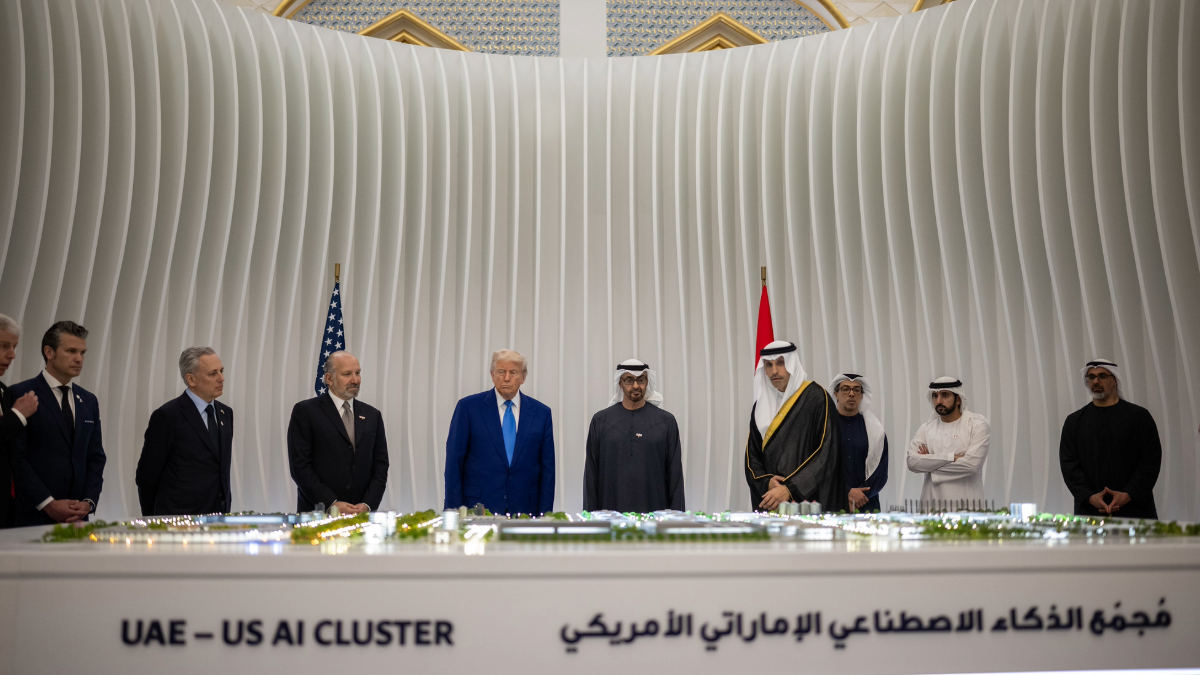The Gulf’s AI Rise and the Risk of Entrenching Authoritarianism
Dima M. Toukan / Nov 25, 2025
President Donald Trump participates in a tour at Qasr Al Watan in Abu Dhabi, United Arab Emirates, Thursday, May 15, 2025. (Official White House Photo by Daniel Torok)
A wave of democratic decline, evidenced by the increasing number of nations retreating from democracy, has been sweeping the world in the last two decades. With the emergence of far-right populist governments across various countries like India and Hungary, the trend is accelerating. The US’s own authoritarian lurch and its changing priorities are not helping. As the leader of the democratic world, its declining democracy signals to other nations that it is right to go down that path.
In the Arab World, already reeling from a severe democracy deficit, Arab leaders are picking up on the not-so-subtle signs. Recent events have been especially favorable for authoritarianism in the region. President Trump has already cut efforts to support democracy abroad, dismantling key US governmental and non-governmental institutions promoting democratic reforms abroad, including in the Middle East. Reductions in foreign aid and changed aid priorities, due in part to the increased securitization of aid to curb migration and terrorism, have also meant a decreased willingness of international actors to press for meaningful political reform in those aid-dependent countries in the region.
The limited democratic overtures of the 2011 Arab Spring ultimately led to a reversion to varying authoritarianism in most countries in the Arab world. Political and civil freedoms are largely missing, authoritarianism has proven resilient, and current geopolitical realignments promise to quash any would-be reforms. Support for authoritarian rule is also rising. The most recent Arab Barometer wave of surveys reveals a sharply declining support for liberal democracy in the region and a rising support for authoritarian governance. Such support has only grown since the Arab Spring.
In the region’s center of gravity, Gulf countries continue to consolidate the transformation of their societies, leveraging soft power to expand their influence and strengthen their geopolitical position. Having been shaken by the prospects of a continuing revolutionary wave following the Arab Spring, Gulf countries used their financial firepower to maintain stability, propping up Arab governments and backing counterrevolutionary actors across the region. Today, their use of an array of tools, including cultural diplomacy, economic investments, and sports, to signal openness, draw attention away from poor human rights records, and cultivate international pull, is earning them soft power points.
Unfolding against this backdrop is the Gulf’s ambitious bid to serve as a critical node in the global AI ecosystem. Partly driven by the need to diversify their economies away from traditional energy, Gulf countries are leveraging their location, infrastructure and more than US$5 trillion in sovereign wealth to build computing capacity for economic growth and AI leadership in the region and the global AI economy.
This drive has an enormous impact on development challenges in the region, especially those related to governance and human rights. The ongoing push-pull dynamic between autocratic and democratic impulses has long been heavily tilting towards the former. AI can very well enhance this dynamic in either direction, depending in part on the regulatory guardrails governing its development, deployment and use.
Gulf countries are going ahead with AI regulation, the contours of which are starting to take shape. To avoid stifling innovation, emerging AI governance is taking on a soft approach driven by non-binding national strategies that encapsulate the countries’ respective national visions for AI transformation, along with ethical guidelines. Such a flexible approach can help propel innovation but the non-binding nature of current instruments may risk cooptation or ethicswashing going forward. AI provisions have been integrated into some laws, but the emphasis in regulatory efforts has remained on non-binding policy instruments. The national strategies, including the UAE National Strategy for AI 2031 and Saudi Arabia’s National Strategy for Data and AI, aptly recognize both ethical and social concerns but allot more weight to economic considerations. As AI capabilities advance, social, political and environmental ramifications are expected to test the effectiveness of this lean regulatory approach for legal bite and enforcement rigor.
Considering the Gulf region’s early embrace of the AI wave and its growing regional and global influence, the Gulf countries’ efforts to shape their AI governance frameworks carry special weight. Such efforts are expected to inform broader developments in the MENA region and the broader Global South, including the development and enforcement of new AI regulatory frameworks. With a record of leveraging technology for surveillance and transnational repression, increased AI capabilities without adequate guardrails could potentially strengthen authoritarianism in the region and governments’ respective ability to quash dissent.
Bent on outflanking China and locking in the Gulf to American technology, the Trump administration has welcomed and supported the Gulf’s AI ambition with multibillion-dollar deals, even relaxing security restrictions, including against the export of advanced semiconductor chips to the Gulf.
The US, for now, is focused on removing barriers to US technological innovation and exports to hold on to its edge in this new geopolitical context. US AI partnerships in the Gulf only come with commercial-grade security safeguards, meaning limited pressure is expected to be applied by the US on the Gulf for responsible AI, and the US’s recent AI Action Plan and its laissez-faire approach to regulation may signal to Gulf countries to follow suit. Considering AI development and deployment in the Gulf are mostly government-led and for now wedded to the US, regulatory safeguards may be deprioritized, feigned, or co-opted, especially since the political economy of many AI investments in the Gulf is still opaque.
While it is too early to comment on the efficacy of Gulf countries’ AI governance model, its potential impact on fundamental rights and on regulatory efforts in the region and beyond cannot be overstated. This, along with the unpredictability of emerging AI systems and their potential for misuse and manipulation, merits a closer look at whether potential risks require a more stringent regulatory approach that goes beyond general guidance.
Authors
